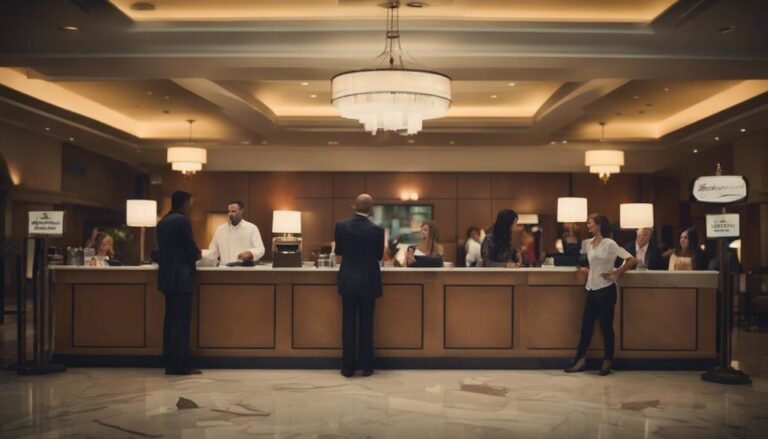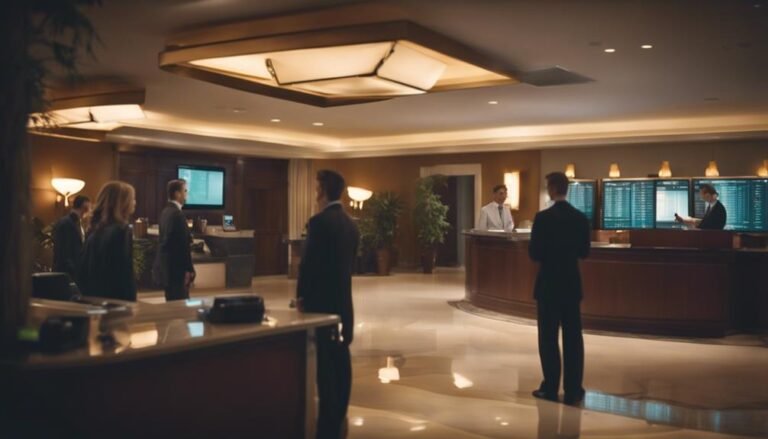Mastering Multichannel Marketing for Hotels and Resorts
Mastering multichannel marketing for hotels and resorts is like navigating a labyrinth of endless possibilities.
You stand at the crossroads of reaching your target audience through various digital avenues, each holding the potential to elevate your brand to new heights.
From decoding the intricacies of consumer behavior to harnessing the power of social media and influencers, the path to success is multifaceted and ever-evolving.
Stay tuned as we unravel the key strategies that will set you on a course towards maximizing your hotel or resort's market presence and driving guest engagement.
Key Takeaways
- Utilize multichannel strategies to enhance brand visibility and customer engagement.
- Implement data-driven insights for personalized marketing and improved conversion rates.
- Leverage social media and content marketing to differentiate from competitors and attract guests.
- Prioritize reputation management to build trust, respond to feedback, and drive customer loyalty.
Importance of Multichannel Marketing
Highlighting the critical role of multichannel marketing in the hospitality industry, we delve into the strategic advantages it offers for hotels and resorts. Multichannel marketing is pivotal in increasing brand awareness and fostering customer engagement across various touchpoints. By leveraging multiple channels such as social media, email, websites, and mobile apps, hotels can create a seamless customer journey that enhances the overall guest experience.
One of the key benefits of multichannel marketing is its ability to boost conversion rates. By reaching customers through different platforms, hotels can strategically guide them through the booking process, increasing the likelihood of conversion. Understanding the customer journey and catering to their needs at each stage allows for personalized interactions that resonate with guests.
Moreover, multichannel marketing not only drives conversions but also strengthens brand awareness. Consistent messaging across different channels reinforces brand identity and builds trust with customers. This cohesive approach ensures that hotels remain top-of-mind throughout the customer journey, leading to enhanced customer engagement and loyalty.
Understanding Your Audience
To effectively engage and target your audience, it's essential to conduct thorough research and analysis of their preferences and behaviors. Understanding your audience through audience segmentation and customer personas enables you to tailor your marketing efforts effectively.
- Audience Segmentation: Divide your audience into distinct groups based on demographics, behavior, or preferences. This allows you to create targeted campaigns that resonate with each segment's specific needs.
- Customer Personas: Develop detailed personas that represent different segments of your audience. By creating fictional characters that embody the traits and preferences of your actual customers, you can personalize your marketing strategies to better connect with each group.
- Behavioral Analysis: Use data analytics to track customer interactions with your brand across various channels. Understanding their behavior patterns can help you anticipate their needs and tailor your marketing messages accordingly.
Leveraging Social Media Platforms
Utilize the power of social media platforms to amplify your hotel or resort's reach and influence.
Craft engaging visual content that captivates your audience and sets you apart from competitors.
Strategically leverage these platforms to showcase your property's unique selling points and attract potential guests.
Social Media Influence
Harnessing the power of social media platforms is essential for hotels and resorts looking to expand their reach and engage with a wider audience. When it comes to social media influence, here are three key strategies to consider:
- Influencer Partnerships: Collaborating with influencers can help amplify your brand's presence and credibility online.
- Strategic Social Media Strategies: Developing a well-thought-out plan is crucial for enhancing brand awareness and driving online engagement.
- Interactive Content Creation: Engaging your audience with interactive posts, polls, and stories can boost social media interactions and strengthen your online community.
Engaging Visual Content
Engage your online audience effectively by incorporating visually captivating content across various social media platforms to enhance brand visibility and drive user interaction.
Visual storytelling plays a crucial role in conveying your hotel or resort's unique identity and experiences.
Ensure brand consistency by maintaining a uniform aesthetic and message across all visual content shared.
Encourage user-generated content by prompting guests to share their experiences through photos and videos, creating a sense of community and authenticity.
Foster interactive experiences by utilizing features like polls, live videos, and interactive posts to boost engagement levels.
Crafting Engaging Email Campaigns
To enhance your hotel or resort's email marketing strategy, focus on crafting compelling subject lines that grab attention and entice recipients to open your emails.
Implement clear and strategic call-to-action buttons within your emails to drive engagement and conversions effectively.
Email Subject Line
Crafting compelling email subject lines is a crucial aspect of creating engaging email campaigns for hotels and resorts. To improve open rates and optimize your A/B testing strategies, consider the following:
- Personalization: Tailoring subject lines with the recipient's name or location can significantly increase open rates.
- Urgency: Creating a sense of urgency by using phrases like 'Limited Time Offer' can prompt immediate action from your audience.
- Clarity and Conciseness: Ensure your subject lines are clear, concise, and to the point, grabbing the reader's attention without being too lengthy.
Call-To-Action Buttons
When designing your email campaigns for hotels and resorts, strategically incorporating compelling call-to-action buttons can significantly enhance user engagement and drive conversions. To boost conversion rates, consider design elements that make your buttons visually appealing and easy to spot.
Ensure that the button placement is strategic, guiding users towards the desired action without being intrusive. User experience plays a crucial role in the effectiveness of your call-to-action buttons. Test different variations to see which ones resonate best with your audience and lead to higher click-through rates.
Optimizing Online Travel Agency Presence
To successfully optimize your presence on online travel agencies, consider implementing a data-driven approach that emphasizes targeted marketing strategies and conversion rate optimization. In the competitive landscape of the hospitality industry, maximizing your visibility on OTAs is crucial for driving bookings and revenue.
Here are three key strategies to enhance your online travel agency presence:
- Strategic OTA Partnerships: Identify and collaborate with high-performing online travel agencies that align with your brand and target audience. By strategically selecting OTA partners, you can expand your reach and attract new guests to your property.
- Direct Booking Incentives: Encourage direct bookings through your hotel website by offering exclusive perks or discounts to guests who choose to book directly with you. This can help you reduce reliance on OTAs and improve your profit margins.
- Dynamic Pricing Strategies: Implement dynamic pricing strategies to maintain rate parity across all distribution channels while optimizing revenue. By leveraging data analytics and market insights, you can adjust your pricing in real-time to stay competitive and maximize revenue potential.
Managing Reviews and Reputation
You need to focus on implementing robust reputation management strategies to ensure your hotel or resort maintains a positive image online.
By leveraging positive guest experiences, you can showcase your property's strengths and build trust with potential guests.
Monitoring and responding promptly to reviews will help you address any issues swiftly and demonstrate your commitment to guest satisfaction.
Reputation Management Strategies
Implementing proactive reputation management strategies is crucial for hotels and resorts to maintain a positive online presence and enhance guest satisfaction. To effectively manage your online reputation and guest feedback, consider the following strategies:
- Monitor Review Platforms: Regularly check popular review sites like TripAdvisor, Google Reviews, and Booking.com to stay informed about what guests are saying about your property.
- Respond Promptly: Address both positive and negative reviews in a timely manner to show guests that their feedback is valued and to demonstrate your commitment to excellent customer service.
- Implement Feedback Loops: Encourage guests to leave reviews by sending post-stay emails with links to review platforms and use feedback to make data-driven improvements that enhance the guest experience.
Leveraging Positive Guest Experiences
Leveraging the wealth of positive guest experiences can significantly bolster a hotel or resort's reputation and amplify its online presence. Guest satisfaction plays a pivotal role in garnering positive online reviews and enhancing customer loyalty. Implementing robust customer service strategies is essential in ensuring that guests have memorable experiences that they're eager to share.
Encouraging guests to leave reviews post-stay can further boost a hotel's reputation and attract more potential guests. Utilizing loyalty programs to reward returning guests for their positive feedback can create a cycle of satisfaction and loyalty. By actively managing reviews and promptly addressing any negative feedback, hotels and resorts can showcase their commitment to guest satisfaction and continuously improve their services to meet and exceed guest expectations.
Implementing Mobile Marketing Strategies
To enhance your hotel or resort's marketing reach, incorporating mobile strategies is essential in today's dynamic digital landscape.
Mobile engagement tactics and user-friendly apps can significantly boost customer interaction and loyalty.
Implementing location-based targeting allows you to reach potential guests in the vicinity, increasing foot traffic and bookings.
Personalized offers tailored to individual preferences and behaviors can enhance the overall guest experience, leading to higher satisfaction and repeat visits.
Integrating Data Analytics
Data analytics integration revolutionizes how hotels and resorts optimize operations and enhance guest experiences. By harnessing the power of data integration and predictive modeling, you can gain valuable insights that drive strategic decision-making and improve overall business performance. Integrating data analytics allows you to tailor marketing efforts, personalize guest interactions, and streamline operational processes effectively.
Consider the following table to understand the benefits of data analytics integration:
| Benefits of Data Analytics Integration |
|---|
| Enhanced guest profiling |
| Real-time performance tracking |
| Personalized marketing campaigns |
Data integration enables you to consolidate information from various sources, providing a comprehensive view of guest preferences and behaviors. This holistic approach enhances your ability to anticipate guest needs and deliver personalized experiences. Additionally, predictive modeling empowers you to forecast trends, optimize pricing strategies, and allocate resources efficiently. Embracing data analytics integration is key to staying competitive in the dynamic hospitality industry.
Collaborating With Influencers
Harnessing the influence of key personalities in the hospitality industry can significantly elevate your brand's visibility and engagement levels, propelling your hotel or resort towards greater success. Collaborating with influencers offers a strategic approach to boosting brand awareness and driving audience engagement.
Here's how you can make the most out of influencer partnerships:
- Strategic Selection: Choose influencers whose values align with your hotel or resort to ensure authenticity in your collaborations. This alignment creates a more genuine connection with the audience, leading to higher engagement levels.
- Collaborative Campaigns: Work closely with influencers to develop creative campaigns that resonate with their followers while promoting your brand. By involving influencers in the campaign ideation process, you can leverage their unique insights to create compelling content that drives brand awareness.
- Audience Engagement: Encourage influencers to interact with their followers through giveaways, Q&A sessions, or behind-the-scenes content related to your hotel or resort. This two-way communication fosters a sense of community and increases audience engagement, leading to long-term brand loyalty.
Measuring Success Metrics
When evaluating the impact of influencer collaborations on your hotel or resort, it's crucial to measure success metrics effectively to gauge the effectiveness of your marketing strategies. Tracking performance and measuring effectiveness are key components in determining the return on investment from these partnerships. Begin by establishing clear objectives and key performance indicators (KPIs) tailored to your specific goals, whether it's increased brand awareness, higher bookings, or enhanced engagement on social media platforms.
Utilize tools like Google Analytics, social media insights, and influencer marketing platforms to gather data on reach, engagement, and conversion rates. Analyze this data regularly to identify trends, patterns, and areas for improvement. By monitoring these metrics consistently, you can adapt your strategies in real-time to optimize results and maximize the impact of your influencer collaborations.
Incorporate feedback from influencers and guests to gain a comprehensive understanding of the overall impact. By combining quantitative data with qualitative insights, you can paint a holistic picture of the success of your multichannel marketing efforts.
Conclusion
As you continue to master multichannel marketing for your hotel or resort, remember to constantly analyze data, collaborate with influencers, and measure success metrics.
Are you ready to elevate your marketing strategies and reach new heights in the hospitality industry? Keep pushing boundaries, adapting to trends, and engaging with your audience to stay ahead of the competition.
Success awaits those who are willing to innovate and evolve in this dynamic landscape.







